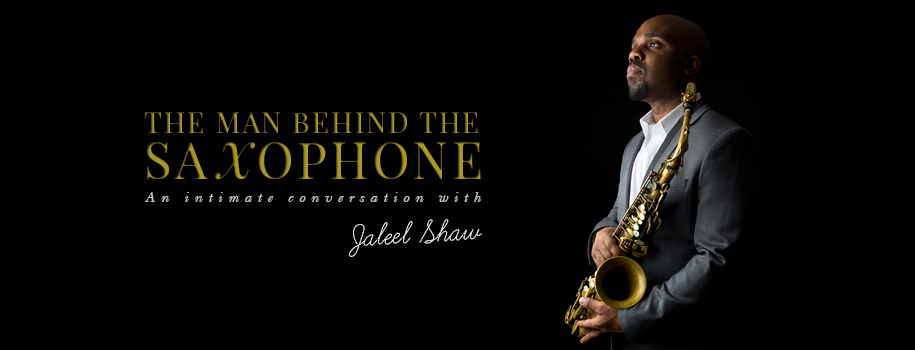
THE MAN BEHIND THE SAXOPHONE: AN INTIMATE CONVERSATION WITH JALEEL SHAW
Musical genius Jaleel Shaw gives // Magazine an inside look on the inspiration behind his music and how he became the musician he is today. The saxophonist recounts how big of a role music plays in his life and how therapeutic it can be.
// Magazine: What makes you exclusive?
JS: I think we are all individuals in our own way. I believe everyone, if given the opportunity can and should shine.
//: What attracted you to the saxophone at such a young age?
JS: I didn’t start playing the saxophone until I was around 9 years old. A man came to my elementary school and played a video for our class. It was a Disney short that tells the history of musical instruments. After he showed us the video, he gave us forms and told us if we were interested in playing, to ask our parents and pick an instrument. I originally wanted to play drums, but I think my mom wasn’t into all the loud noise and eventually we settled on the saxophone. Once I got it, I never really wanted to quit.
//: I read in your blog that you were very inspired by Mulgrew Miller, were there any other musicians that inspired you as well?
JS: Yes. Mulgrew is still a favorite of mine. Very original and very humble. You can hear and feel the sincerity in his music. That’s very important to me. When we perform, we are telling are story. We are telling people who we are. I like meeting musicians after hearing them perform and seeing that their music is a true extension of who they truly are personally. I can imagine John Coltrane was like that. He’s another musician that has really inspired me. It’s not only about the music, but the intention behind the music. Why he was playing is just as important as what he played. There’s something very clear and serious about what Coltrane had to say. He had an agenda. That’s important to me. There are many others. Charlie Parker, Cannonball Adderley, Lee Konitz are some of the other greats that have inspired me. Of the musicians that are still with us now, I really like what musicians like Mark Turner, Myron Walden, Kurt Rosenwinkel, and Chris Potter are doing. They are musicians that are just a little older than me that continue to inspire me in many ways.
//: Are there any artist in the hip hop industry that you would like to collaborate with in the future?
JS: I’d have to say Madlib, MF Doom, the Roots, & Ghostface come to mind.
//: What is your perspective on hip hop music and the industry?
JS: I don’t know much about the hip hop industry today to be honest. I don’t really buy that many hip hop albums these days. It’s a little different today. The lyrical content and the music that’s sampled isn’t the same as what I heard coming up and still listen to today. I grew up listening to music by A Tribe Called Quest, Public Enemy, De La Soul, and The Pharcyde. Groups like that. Most of those groups were sampling lots of Jazz and had different lyrical content than some of today’s hip hop. I think that’s why I gravitated towards that.
//: In your opinion is there a correlation between jazz and hip-hop? Explain.
JS: Well to me hip hop comes from Jazz. And to ME jazz and hip hop have in many ways represented me, my culture, my community, and my experiences as African American. I guess today it means different things for different people. But that’s definitely what it means to me.
//: You received two ASCAP young composer awards, you were nominated for various awards, and you were listed as 2011’s Alto Saxophonist of the year, after all of that success what’s your next goal of achievement?
JS: I just want to keep doing what I’m doing. Continue to write, continue to release recordings, continue to practice, and continue traveling and performing around the world.
//: What expectations do you have of your most recent album The Soundtrack of Things to Come?
JS: This album like all of my albums is another documentation of where I am in life. So I’m sharing my experiences with people in life. Hopefully giving them something that they can relate to. Something that will bring them happiness, or help them get through a certain moment of their lives. I hope this music, like all of my albums are a soundtrack to their lives in some way and that it touches them like it has touched me. This album is actually over a year old now, so I’m more thinking about my next album now.
//: What was your inspiration behind your choice for your album cover, The Soundtrack of Things to Come?
JS: I chose the picture for my album cover because it showed me as a baby playing this toy saxophone. Although I wasn’t playing any music then and had no idea I was going to be a musician, my mom has a picture of me playing a toy saxophone at the age of 3. It’s still pretty amazing to me that that picture exists. The album is about life and music… About how life inspires music and music inspires life. I feel like music has been in me all along. It’s who I am. It continues to inspire my life as my life continues to inspire my music. I wrote the music for the album before some very serious personal life changes occurred. When all of these things happened, I went back to the recent compositions, and they all spoke to the things going on in my life. I basically wrote the soundtrack before those things happened. The kid in that picture represents the innocence in all of that. The kid that just has fun playing music and doesn’t know how big of an effect it’s going to have on his life in the future.
//: How do you think Soundtrack of Things to Come differs from your last album Optimism?
JS: I think the Soundtrack of Things to Come is a more personal album. It deals with personal things in my life and how I transfer those emotions into music. It’s a more emotional album and introspective. Optimism was more based on my influences and creativity. I drew from influences from many different genres. It was more about who I am and what I’m made of as an artist.
//: What was your inspiration behind the new album? Were there any details or events from your life that you pulled from and put into music form?
JS: My inspiration for this album was born out of loss and revelation. After I composed the music, I lost some very close people to me. My life changed in a way I wasn’t prepared for. All of the compositions I wrote before this incidents occurred spoke directly to them. Even the titles fit. It’s still hard for me to believe it worked out like that, but the music was born before the experience this time. I don’t want to give all the details away, because it’s actually all written in the liner notes of the album, but the music is based on my feelings at this moment. The compositions are meant to express every emotion that I felt while having these experiences and thoughts.
//: Since your music is strictly instrumental and no vocals, how do you make sure the correct tone and message is conveyed through your music?
JS: Although I do give full descriptions on almost every song in the liner notes of this recent album, I sometimes think the beauty of instrumental music is that it allows the listener to relate to the music in his/her own way. When there are no lyrics, the listener can interpret the music to be anything he/she wants it to be. A piece can remind someone of love, whereas it may remind someone else of something sad. You can go anywhere you want with music that doesn’t have lyrics. You can use your own imagination and come up with your own scenario so that the music serves you anyway you want.
//: What is one thing that you want a person to walk away with or learn about you after listening to your music?
JS: I want my music to help people, to make them happy, make them reflect, and to encourage, motive, or enrich their lives and experiences.
//: How are your shows internationally different from the US shows?
JS: My shows internationally aren’t very different from the US shows. It’s different from place to place. One show in Paris can be just like a show in NY. It all depends on the energy of the audience at the moment. Sometimes that’s based on the following that a specific venue has or the type of atmosphere a specific venue has. Some venues are used to a more quiet audience, while some venues support a more interactive audience. It definitely differs from town to town more than country to country.
//: What’s one thing that sets you apart from other musicians? Your signature.
JS: I try my best to be me and learn about who I am from my experiences. Being an artist is a huge blessing because it allows me to find myself and understand so much about who I am through creativity.
Throughout Shaw’s career he has managed to stay humble and grateful for all of his accomplishments. With a new album in the works, we can only image what he has in store for his fans this time. To find out more about Jaleel Shaw visit www.jaleelshaw.com.
